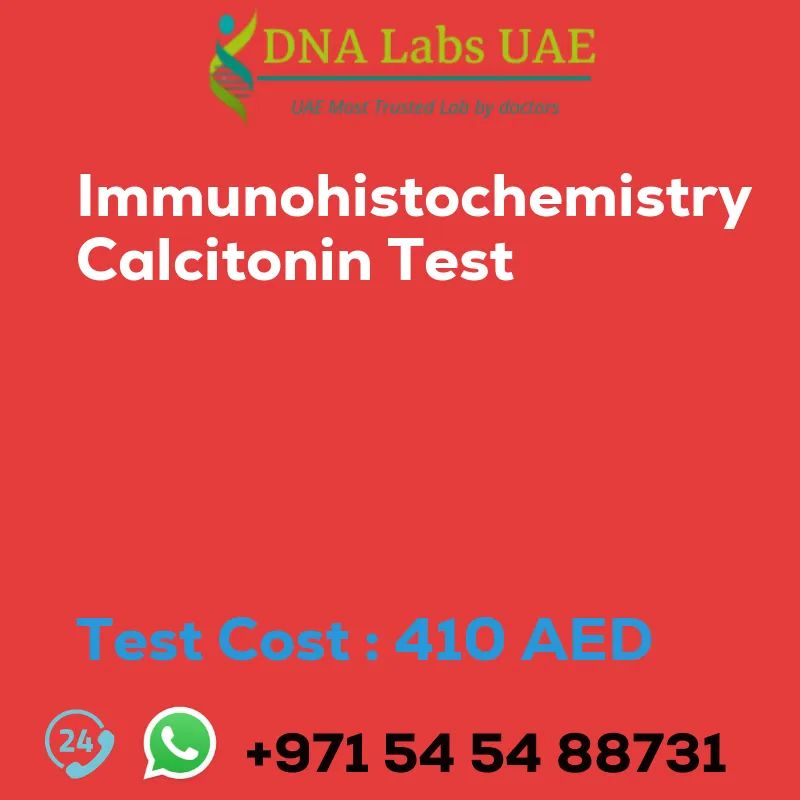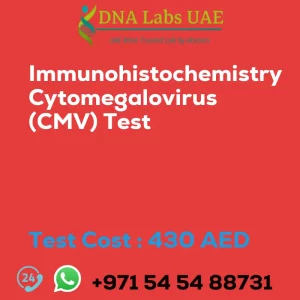IMMUNOHISTOCHEMISTRY CALCITONIN Test
Test Name: IMMUNOHISTOCHEMISTRY CALCITONIN Test
Components: Calcitonin Test
Price: 410.0 AED
Sample Condition: Submit tumor tissue in 10% Formal-saline OR Formalin fixed paraffin embedded block. Ship at room temperature. Provide a copy of the Histopathology report, Site of biopsy and Clinical history.
Report Delivery: Sample Daily by 6 pm; Report Block: 5 days, Tissue Biopsy: 5 days, Tissue large complex: 7 days
Method: Immunohistochemistry
Test Type: Cancer
Doctor: Oncologist, Pathologist
Test Department: DNA Labs UAE
Pre Test Information: Provide a copy of the Histopathology report, Site of biopsy and Clinical history.
Test Details
Immunohistochemistry (IHC) is a technique used to detect specific proteins in tissue samples. The calcitonin test is an example of an IHC test that is used to detect the presence of calcitonin in tissue samples. Calcitonin is a hormone produced by the C-cells of the thyroid gland and is involved in regulating calcium levels in the body.
Abnormal levels of calcitonin can indicate certain conditions, such as medullary thyroid cancer or hypercalcemia.
To perform the calcitonin IHC test, the following steps are typically followed:
- Tissue sample preparation: A tissue sample, usually from the thyroid gland, is collected and fixed in formalin. The tissue is then embedded in paraffin wax and sliced into thin sections.
- Deparaffinization and rehydration: The paraffin wax is removed from the tissue sections using xylene, and the sections are rehydrated using a series of alcohol washes.
- Antigen retrieval: Heat-induced antigen retrieval methods are used to unmask the calcitonin antigen in the tissue sections. This involves heating the sections in a buffer solution to expose the antigenic sites.
- Blocking: Non-specific binding sites on the tissue sections are blocked using a protein blocking agent, such as bovine serum albumin or normal serum.
- Primary antibody incubation: The tissue sections are incubated with a primary antibody specific to calcitonin. The primary antibody binds to the calcitonin antigen if present in the tissue sections.
- Secondary antibody incubation: The tissue sections are then incubated with a secondary antibody that is conjugated to a detection system, such as a fluorescent or enzymatic label. The secondary antibody binds to the primary antibody, allowing for visualization of the calcitonin antigen.
- Visualization: If an enzymatic label is used, a chromogenic substrate is added, which produces a visible color reaction at the site of the antigen-antibody complex. If a fluorescent label is used, the tissue sections are visualized using fluorescence microscopy.
- Counterstaining and mounting: To enhance the contrast and visualization of the tissue sections, a counterstain, such as hematoxylin, may be applied. The sections are then mounted on glass slides for examination under a microscope.
The presence and distribution of calcitonin in the tissue sections can be evaluated based on the staining pattern observed. The intensity and location of the staining can provide information about the presence and localization of calcitonin in the tissue sample.
It is important to note that the calcitonin IHC test is a laboratory procedure performed by trained professionals. The interpretation of the results should be done by a pathologist or a qualified healthcare provider.
| Test Name | IMMUNOHISTOCHEMISTRY CALCITONIN Test |
|---|---|
| Components | |
| Price | 410.0 AED |
| Sample Condition | Submit tumor tissue in 10% Formal-saline OR Formalin fixed paraffin embedded block. Ship at room temperature. Provide a copy of the Histopathology report, Site of biopsy and Clinical history. |
| Report Delivery | Sample Daily by 6 pm; Report Block : 5 days Tissue Biopsy : 5 days Tissue large complex : 7 days |
| Method | Immunohistochemistry |
| Test type | Cancer |
| Doctor | Oncologist, Pathologist |
| Test Department: | |
| Pre Test Information | Provide a copy of the Histopathology report, Site of biopsy and Clinical history. |
| Test Details |
Immunohistochemistry (IHC) is a technique used to detect specific proteins in tissue samples. The calcitonin test is an example of an IHC test that is used to detect the presence of calcitonin in tissue samples. Calcitonin is a hormone produced by the C-cells of the thyroid gland. It is involved in regulating calcium levels in the body. Abnormal levels of calcitonin can indicate certain conditions, such as medullary thyroid cancer or hypercalcemia. To perform the calcitonin IHC test, the following steps are typically followed: 1. Tissue sample preparation: A tissue sample, usually from the thyroid gland, is collected and fixed in formalin. The tissue is then embedded in paraffin wax and sliced into thin sections. 2. Deparaffinization and rehydration: The paraffin wax is removed from the tissue sections using xylene, and the sections are rehydrated using a series of alcohol washes. 3. Antigen retrieval: Heat-induced antigen retrieval methods are used to unmask the calcitonin antigen in the tissue sections. This involves heating the sections in a buffer solution to expose the antigenic sites. 4. Blocking: Non-specific binding sites on the tissue sections are blocked using a protein blocking agent, such as bovine serum albumin or normal serum. 5. Primary antibody incubation: The tissue sections are incubated with a primary antibody specific to calcitonin. The primary antibody binds to the calcitonin antigen if present in the tissue sections. 6. Secondary antibody incubation: The tissue sections are then incubated with a secondary antibody that is conjugated to a detection system, such as a fluorescent or enzymatic label. The secondary antibody binds to the primary antibody, allowing for visualization of the calcitonin antigen. 7. Visualization: If an enzymatic label is used, a chromogenic substrate is added, which produces a visible color reaction at the site of the antigen-antibody complex. If a fluorescent label is used, the tissue sections are visualized using fluorescence microscopy. 8. Counterstaining and mounting: To enhance the contrast and visualization of the tissue sections, a counterstain, such as hematoxylin, may be applied. The sections are then mounted on glass slides for examination under a microscope. The presence and distribution of calcitonin in the tissue sections can be evaluated based on the staining pattern observed. The intensity and location of the staining can provide information about the presence and localization of calcitonin in the tissue sample. It is important to note that the calcitonin IHC test is a laboratory procedure performed by trained professionals. The interpretation of the results should be done by a pathologist or a qualified healthcare provider. |








